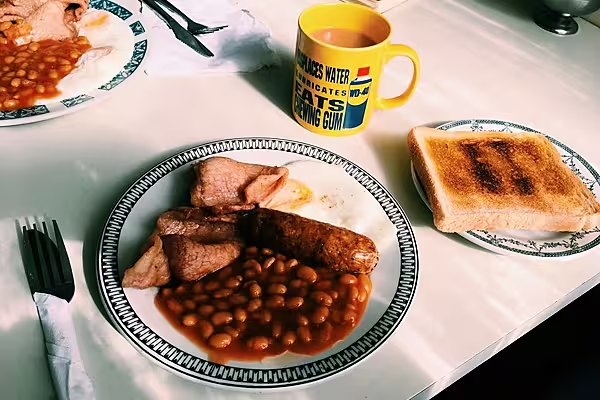The U.K.’s legendary morning feast may be a perfect metaphor for how Brexit will make British life more expensive.
Politicians including Scottish First Minister Nicola Sturgeon and Labour Party leader Jeremy Corbyn who have confused “Brexit” with “breakfast” are on to something more than a phonetic mistake. Ultimately, it’s what the U.K.’s departure from the European Union means for the island nation, served up hot on a plate, according to analysis from KPMG.
British consumers could see the price of a fry-up -- a classic English breakfast with ingredients like bacon, sausages, orange juice, baked beans and mushrooms -- increase by almost 13 percent. Tariffs would hike up the cost of imports of many breakfast staples under WTO rules if the U.K. quits the bloc with no free trade arrangement or transitional agreement in place.
Future Relationship
While a year has passed since the U.K. voted to leave the EU, Prime Minister Theresa May’s mantra that “Brexit means Brexit” hasn’t helped clarify what the future relationship with the bloc will look like. May has until March 2019 to secure a deal with European leaders, and negotiations are off to a rocky start, with the EU’s chief negotiator Michel Barnier warning last week that a “frictionless” trade relationship won’t be possible.
Orange juice and olive oil from Spain and Italy would likely have the biggest price increases at 34 percent and 30 percent respectively, according to the report.
Regardless of the trade deal the U.K. eventually brokers, households are already experiencing a squeeze as the pound’s fall since the Brexit vote lifts the cost of all imports, from clothes to computers. Economic growth is starting cool as wage growth fails to keep up with inflation.
“Our analysis does not even reflect the steep costs consumers and retailers are already facing as a result of the pound sterling’s devaluation or the costs of any new non-tariff barriers,” said Bob Jones, a director at KPMG.
News by Bloomberg, edited by ESM. Click subscribe to sign up to ESM: The European Supermarket Magazine.














